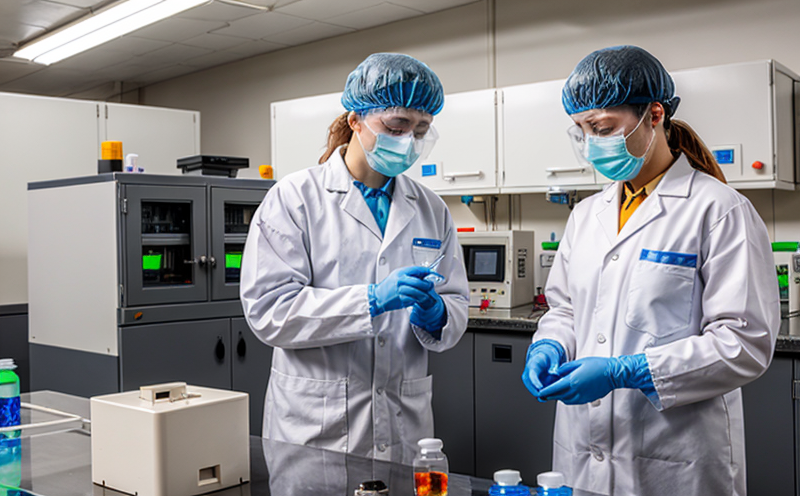EN 19382 3-MCPD Analysis in Processed Dairy Foods
The European Standard EN 19382 specifies methods for determining 3-monochloropropane-1,2-diol (3-MCPD) esters in processed dairy foods. This standard is crucial for ensuring the safety and quality of food products by setting limits on potentially harmful contaminants that might arise during processing.
Processed dairy products often undergo various stages of manufacturing where heat treatment can lead to the formation of 3-MCPD esters, which are a group of chloropropanols. These compounds can form as a result of heating processes and have been associated with potential health risks if present in food at higher than acceptable levels.
The analysis involves precise sample preparation followed by instrumental analysis using either liquid chromatography coupled with tandem mass spectrometry (LC-MS/MS) or gas chromatography-mass spectrometry (GC-MS). These methods ensure accurate quantification of 3-MCPD esters, providing data that can be used to adjust processing parameters and maintain product quality.
The standard provides detailed instructions on sample preparation, including the use of appropriate extraction solvents and conditions. It also outlines the calibration procedures necessary for obtaining reliable results. Compliance with EN 19382 is essential for food manufacturers to ensure their products meet regulatory requirements set by authorities such as the European Commission.
Accurate analysis of 3-MCPD esters in processed dairy foods not only helps maintain product safety but also allows companies to demonstrate adherence to international standards. This can enhance consumer confidence and trust, which is vital given increasing public awareness about food quality and safety issues.
The methodology described in EN 19382 ensures robust analytical results that contribute significantly to maintaining the integrity of processed dairy products. By adhering to this standard, laboratories play a crucial role in supporting the industry’s commitment to delivering high-quality, safe foods to consumers worldwide.
Quality and Reliability Assurance
The quality assurance process for EN 19382 involves rigorous validation of analytical methods to ensure consistent and accurate results. This includes thorough calibration checks, method optimization, and regular performance verification tests. Laboratories must be accredited by recognized bodies such as ISO/IEC 17025:2017 or equivalent standards, ensuring that their facilities meet stringent quality requirements.
Reliability assurance is achieved through meticulous documentation of all analytical procedures, including detailed records of sample preparation, analysis conditions, and results. This documentation provides traceability and transparency, allowing for reproducibility of tests and enabling continuous improvement in laboratory practices.
Laboratories specializing in this service should have well-trained staff proficient in using advanced instrumentation such as LC-MS/MS or GC-MS. Regular training programs are essential to keep personnel updated on the latest techniques and methodologies. Additionally, participation in proficiency testing schemes organized by recognized bodies ensures that laboratories maintain high standards of performance.
Customer satisfaction is further enhanced through clear communication with clients regarding service offerings, timelines, and any requirements for sample submission or data interpretation. By providing reliable and accurate results within agreed-upon timeframes, laboratories can build strong relationships with their customers, fostering long-term partnerships based on trust and reliability.
Customer Impact and Satisfaction
The implementation of EN 19382 analysis in processed dairy foods has a significant positive impact on customer satisfaction. By ensuring that products meet or exceed regulatory standards for 3-MCPD esters, manufacturers can confidently market their goods as safe and compliant with international guidelines.
Clients benefit from having access to detailed analytical reports that provide insights into the presence and concentration of 3-MCPD esters in their products. This information allows them to make informed decisions about process optimization or ingredient substitution if necessary. The transparency offered by these reports also helps build trust between manufacturers and consumers, reinforcing brand loyalty.
For R&D teams within food companies, compliance with EN 19382 provides a benchmark against which new formulations can be tested. This ensures that any changes made to product formulations are evaluated for their potential impact on the levels of 3-MCPD esters before they reach commercial production stages.
Compliance officers responsible for ensuring adherence to regulatory requirements find value in having reliable analytical data at their disposal. They can use this information to justify decisions related to quality control measures, ingredient sourcing strategies, and ongoing monitoring programs designed to maintain compliance with relevant regulations.
Use Cases and Application Examples
| Use Case | Description |
|---|---|
| Dairy Product Quality Assurance | Ensuring that processed dairy products meet the 3-MCPD ester limits specified by EN 19382. |
| New Product Development | Evaluating new formulations to ensure they comply with regulatory requirements before launch. |
| Ingredient Sourcing Verification | Verifying the quality of raw materials used in dairy products to minimize contamination risks. |
| Process Optimization | Identifying areas where process changes could reduce 3-MCPD ester formation during manufacturing. |
| Supply Chain Management | Maintaining consistent quality across different batches of processed dairy products throughout the supply chain. |
| Compliance Monitoring | Regularly assessing compliance with regulatory limits to ensure ongoing adherence to standards. |
| Risk Assessment and Mitigation | Evaluating potential risks associated with 3-MCPD ester contamination in processed dairy products and implementing mitigation strategies accordingly. |
These use cases highlight the importance of EN 19382 analysis in maintaining high standards of product quality and safety. By addressing these areas, laboratories contribute significantly to enhancing overall customer satisfaction while supporting food manufacturers' compliance efforts.





